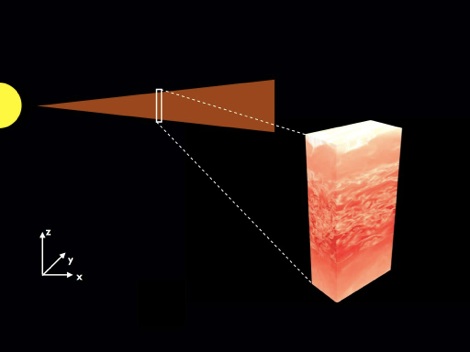How do accretion disks work?
 Matter that happens to get to a vicinity of a black hole hardly ever falls straight down into the black hole. In the universe, everything rotates: the Earth rotates around its axis, all planets rotate and also orbit the Sun, which also slowly moves around the center of our Galaxy together with all the other stars in the Milky way. We physicist speak about so called angular momentum, which is a quantity that represents a potential of two objects to orbit each other. Event objects that initially move towards each other along straight trajectories, but do not approach one another head to head but go slightly off, have some angular momentum that will make their trajectories to curve and if they are gravitationally bound, they will end up orbiting each other. Like energy, angular momentum is conserved. That is why the Earth keeps going around the Sun already for 5 billion years without falling down to it. It just keeps its angular momentum as in empty space there is nothing that would remove the angular momentum from it.
Matter that happens to get to a vicinity of a black hole hardly ever falls straight down into the black hole. In the universe, everything rotates: the Earth rotates around its axis, all planets rotate and also orbit the Sun, which also slowly moves around the center of our Galaxy together with all the other stars in the Milky way. We physicist speak about so called angular momentum, which is a quantity that represents a potential of two objects to orbit each other. Event objects that initially move towards each other along straight trajectories, but do not approach one another head to head but go slightly off, have some angular momentum that will make their trajectories to curve and if they are gravitationally bound, they will end up orbiting each other. Like energy, angular momentum is conserved. That is why the Earth keeps going around the Sun already for 5 billion years without falling down to it. It just keeps its angular momentum as in empty space there is nothing that would remove the angular momentum from it.

Quite similarly, matter that gets down to a black hole is also likely to have some angular momentum and thus it will start to orbit the black hole. In order for the matter to fall into the black hole, it must get rid of its angular momentum first. That happens most likely through interactions with other matter particles that are around. In those collisions some particles can exchange angular momentum, some of them gain, some loose. Kinematic viscosity only does not seem to be able to redistribute enough of angular momentum and we think magnetic fields actually do most of the work. They mix the gas particles from neighbouring layers creating a huge amount of turbulence and give plenty of chances to individual particles to exchange their angular momentum. Total amount of angular momentum is kept in those intaractions, but particles that loose momentum can move closer to the black hole. As you can imagine, it is quite a slow process. The matter can make only a gradual progress down towards the black hole while it must keep going around it. Little by little pieces of matter manage to loose enough angular momentum that they finally end up swallowed by the black hole event horizon. We call the whole process accretion.

